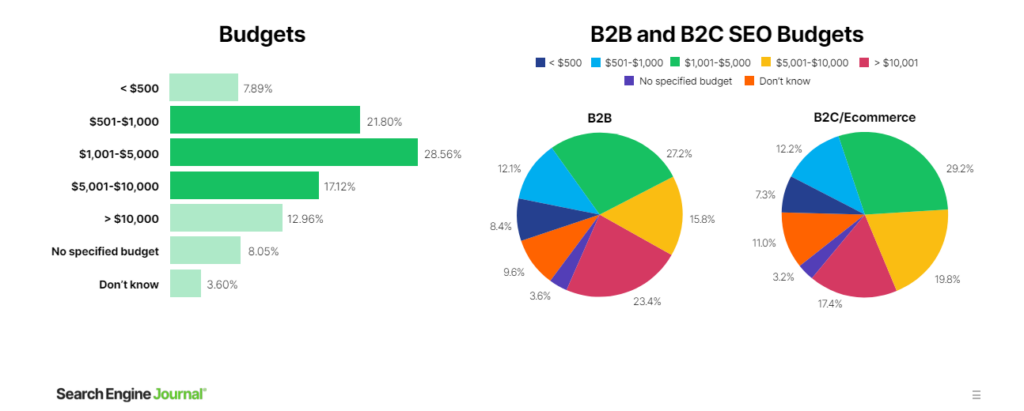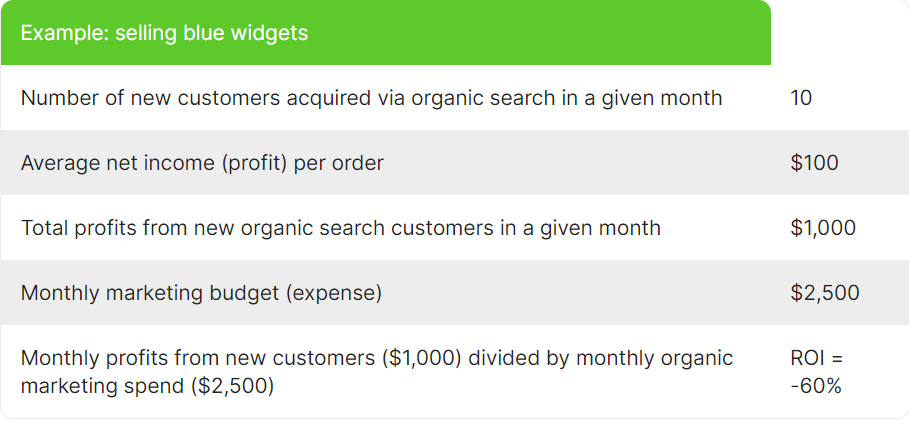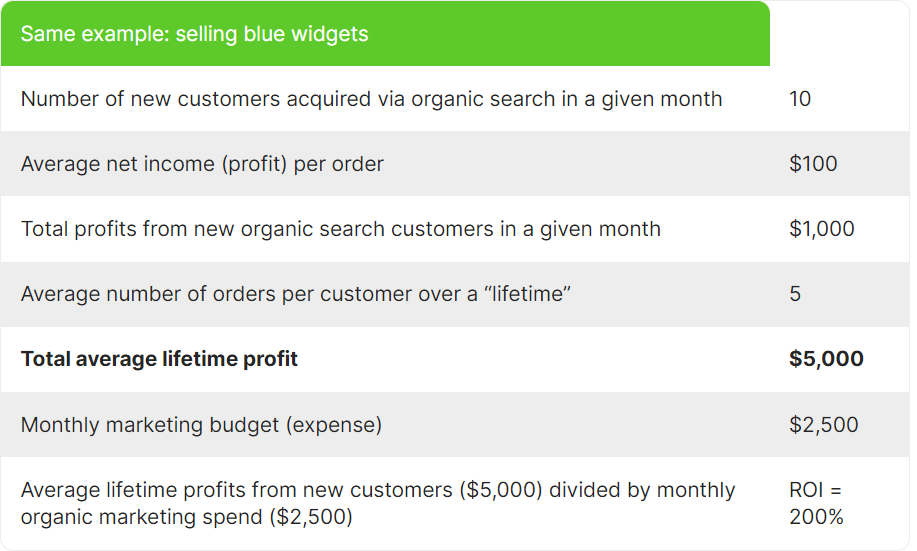

Last updated on

Digital marketing has become the primary channel for many companies. However, numerous owners and executives still find it challenging to allocate budgets for online marketing, particularly when it comes to SEO. The complexity of budgeting for SEO is influenced by factors such as project scope, industry competition, and specific services required. Unlike other expenses, there isn’t a one-size-fits-all formula or calculator for determining SEO costs. This article delves into the essential components of SEO pricing and provides guidance on calculating and strategizing your budget effectively.
Investing sufficiently in SEO services can have a profound impact on your online presence and business growth. Recent data indicates that a significant portion of SEO professionals operate within monthly budgets ranging from $500 to $5,000, with 28.6% allocating between $1,001 and $5,000.

Despite the potential benefits, many business owners hesitate to invest in SEO due to a lack of understanding about how search marketing functions and the demands of managing their businesses. Unlike other industries that follow standardized processes to achieve specific outcomes, SEO is often misunderstood as a commoditized service.
This misunderstanding can lead business owners to fall prey to enticing but unrealistic offers, such as $99/month “guaranteed page one” services promoted by spammers and scammers, which rarely deliver tangible results.
I’m part of several internet marketing groups on Facebook, where I’ve noticed a concerning trend: numerous inexperienced individuals presenting themselves as SEO professionals and taking on clients.
Frequently, you’ll come across questions like: “I’ve just acquired a client looking to rank for [keyword x] – what’s the best approach?”
Another issue is the use of dubious link strategies, such as private blog networks and parasite SEO on third-party pages, often without adequately informing clients of the associated risks. Many resort to AI for generating content at a massive scale, often neglecting proper fact-checking.
However, it’s important to note that AI can be a valuable asset when employed ethically in SEO practices.
AI plays a crucial role in automating data analysis, identifying patterns, and streamlining content creation and optimization. This capability not only reduces SEO costs but also enhances efficiency.
However, hiring incompetent SEO professionals can lead to significant repercussions beyond wasted money. The consequences of opting for “cheap SEO” can be severe, potentially resulting in a Google penalty that severely impacts a website’s online visibility.
Business owners need to be aware that they bear ultimate responsibility for the SEO strategies implemented on their websites. It’s essential for them to thoroughly discuss the tactics proposed by service providers before committing to any agreement.
Google considers over 200 ranking factors, which can seem overwhelming and cause paralysis.
However, the good news is that by concentrating on three essential factors, you can achieve significant results in any industry.
Here’s what you should prioritize:
Ensure your website:
Your website’s content should adhere to best practices outlined in the Search Quality Ratings Guidelines, with a focus on:
Natural link building strategies are crucial. Avoid using tactics such as private blog networks (PBNs) and paid guest posts. Instead, prioritize acquiring links from websites that are relevant to your topic and offer high-quality content.
Quality is paramount: A smaller number of links from highly trusted, authoritative, and relevant websites can deliver better results than a larger quantity of links from lower-quality sources.
Before setting a budget, it’s essential to outline clear goals for your campaign.
These goals should encompass measurable outcomes, a specified timeline, and tangible criteria for success.
While keyword rankings were once the primary measure of success, today’s metrics have evolved. While search engine results pages (SERPs) still matter, they are not paramount.
In my view, the most critical metrics are those directly influencing business outcomes. Metrics like organic sessions, goal conversions, and revenue are central to this category.
Goal setting could involve objectives like boosting organic sessions by X%, increasing monthly conversions by Y, and/or growing revenues by Z%.
When defining goals, it’s crucial to consider a couple of key factors.
Firstly, goals should be realistic and achievable. While ambitious targets are acceptable, overly optimistic benchmarks can discourage progress.
Equally important is allowing sufficient time for the campaign to yield results.
As stated by Google:
‘…in most cases, SEO efforts typically require four months to a year for businesses to implement improvements and begin to see potential benefits.’
Your objectives will dictate the strategies required for achieving success. Consequently, this establishes a foundation for crafting a detailed action plan and allocating the budget required to execute it effectively.
This brings us back to the core of positioning and focusing on the crucial factors that drive progress.
The responses to these inquiries will define the priorities and scope of effort necessary to achieve your objectives.
Often, the tasks completed remain consistent across different budget levels; the distinction lies in the quantity of work accomplished.
For instance, if you double the amount of content and backlinks with budget “B” compared to budget “A,” you’re likely to achieve results sooner with the higher allocation.
However, the key is to choose a budget that you can comfortably sustain for at least 6 to ideally 12 months, without causing undue stress.
Effective campaigns require time for thorough planning, implementation, and refinement to accurately gauge their effectiveness.
Additionally, keep in mind that lower budgets typically extend the duration required to achieve desired outcomes.
For a local campaign, typical budgets range from $1,001 to $5,000 per month, as found in a 2023 survey by SEJ of SEO professionals.
For national or international campaigns, budgets often exceed $10,000 per month, reflecting the broader scope and scale involved.
Certain firms provide a “trial package” at a reduced rate and without a contract, allowing potential clients to test their services with minimal risk.
If hiring a top-level SEO professional is not within your budget, several alternatives exist. A popular choice is a one-time website SEO audit that provides actionable recommendations.
Simply optimizing your website can often result in a significant increase in organic traffic. Additionally, professionals can assist with content development and keyword analysis for a one-time fixed fee.
Alternatively, you can opt to become proficient and handle SEO yourself.
Here is a commonly used calculator for measuring return on investment (ROI) for SEO, though it may not always provide accurate results.

The above calculator’s flaw lies in its failure to account for the lifetime value of a new customer.
For online retailers, repeat business is crucial for growth. By neglecting to factor in the lifetime value of a new customer, the true ROI can be significantly underestimated.
The correct approach to calculating ROI involves incorporating lifetime value into the equation. To accurately determine the ROI of SEO, use the following formula:
Average lifetime profits from new customers acquired in one month divided by monthly organic marketing spend.

As evident, that single variable significantly alters how the ROI is expressed.
Unlike PPC, organic search campaigns do not yield immediate results. A comprehensive SEO strategy includes technical SEO, content marketing, and link-building. Even when executed perfectly, it takes time for Google to acknowledge and reward these efforts. However, traffic generated from SEO is typically the most reliable and highest-converting among all marketing channels.
Original news from SearchEngineJournal